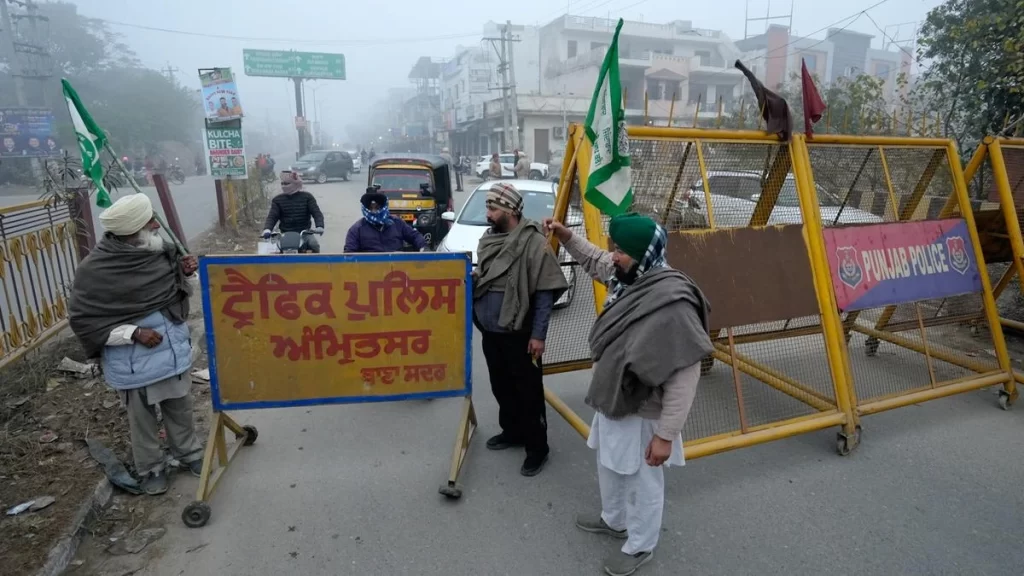Punjab witnessed widespread disruptions on Monday, December 30, 2024, as farmers enforced a statewide bandh to protest the Central government’s failure to meet their long-standing demands. Organized by the Samyukta Kisan Morcha (Non-political) and Kisan Mazdoor Morcha, the shutdown, which ran from 7 a.m. to 4 p.m., paralyzed traffic and affected daily life across the state.
In a show of defiance and unity, farmers blocked major roads and highways, severely affecting vehicular movement. In Amritsar, protesters congregated at the Golden Gate near the city’s entry point, bringing traffic to a standstill. Similarly, in Bathinda’s Rampura Phul, farmers formed roadblocks, making it nearly impossible for commuters to pass.
One of the most significant disruptions occurred at the Dhareri Jattan Toll Plaza, where farmers staged a sit-in protest. This action hampered traffic flow on the Patiala-Chandigarh National Highway, creating long queues of stranded vehicles.
Farmer leaders ensured that emergency services were exempt from the bandh’s restrictions. “Our protest is not meant to inconvenience ordinary people,” said Sarwan Singh Pandher, a prominent farmer leader. “Emergency services, travel to airports, job interviews, and wedding-related commutes have been deliberately kept out of the bandh’s purview.”
Despite these assurances, the bandh’s impact on the public was palpable, with markets, offices, and transport services across Punjab either shuttered or operating at minimal capacity.
Amid the escalating protest, the condition of 70-year-old farmer leader Jagjit Singh Dallewal remains critical as his hunger strike entered its 35th day. Refusing medical assistance, Mr. Dallewal has pledged to continue his fast until the government provides a legal guarantee for a minimum support price (MSP) for crops.
The Supreme Court has intervened, granting the Punjab government until December 31 to convince Mr. Dallewal to move to a hospital. The court has also allowed the state to seek logistical support from the Centre if necessary. However, Mr. Dallewal remains resolute, asserting that his fast will only end when farmers’ demands are met.
The protesting farmers, united under the banners of SKM (Non-Political) and Kisan Mazdoor Morcha, are fighting for more than just MSP. Their demands include a comprehensive debt waiver, old-age pensions for farmers, a rollback of increased electricity tariffs, the withdrawal of police cases against farmers, and justice for the victims of the 2021 Lakhimpur Kheri violence.
Protests have intensified since February 13, when thousands of farmers camped at the Shambhu and Khanauri border points between Punjab and Haryana after being stopped by security forces during their march to Delhi.
Frustration among farmers has been mounting due to repeated roadblocks in their efforts to take their grievances to the nation’s capital. Between December 6 and 14, a “jatha” of 101 farmers attempted to march to Delhi on foot three times, only to be stopped each time by Haryana security personnel.
The Punjab government finds itself in a precarious position as the protests grow louder and Mr. Dallewal’s health worsens. The administration has been criticized for failing to mediate effectively between the farmers and the Centre, despite repeated assurances of support for the farming community.
Chief Minister Bhagwant Mann has called for urgent intervention from the Centre, urging it to address the farmers’ demands and prevent the situation from spiralling further out of control.
While many Punjab residents sympathize with the farmers’ cause, others express frustration at the disruptions caused by the bandh. “I support the farmers, but the roadblocks and shutdowns make life difficult for the common man,” said a commuter stranded near Amritsar.
Businesses, especially small-scale enterprises, bore the brunt of the shutdown, with shopkeepers reporting significant losses due to the lack of customers.
As the year draws to a close, tensions in Punjab show no signs of abating. Farmers have announced a meeting on January 4 to discuss their next steps. With the Centre yet to respond decisively to their demands, the possibility of further protests looms large.
For the people of Punjab, the bandh is a stark reminder of the farmers’ relentless struggle for justice. As the movement gains momentum, all eyes are on the state and central governments to find a resolution that respects the farmers’ sacrifices and alleviates the hardships faced by the public.




